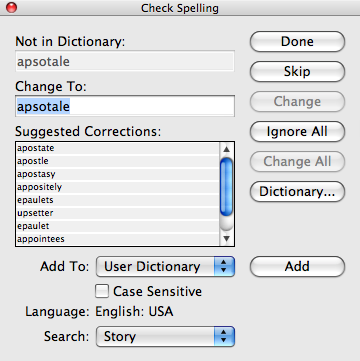Spell Checking Is No Replacement for a Good Proofer
We’ve said it before, and I’m sure we’ll say it again: Just because you run a spell-check on something doesn’t mean that it’s right. InDesign does a pretty good job of checking spelling, but it’s not perfect. After all, if you write “The not is hard to tie” it will spell-check correctly but is incorrect (should be “knot”).
Another lesson we should all remember is that human error can creep in, even when Check Spelling is trying to do the right thing. Take, for example, the recent example of The Daily Universe, the student paper at Brigham Young University in Utah. Basically, a student editor ran a spell-check in InDesign, found a misspelling (“apsotale”), and replaced it with the first suggestion InDesign offered: “apostate” rather than the second (correct) suggestion “apostle.” While the words are similar, they mean very, very different things.

You could argue that InDesign have known better, but the program will always just be software (we hope) and so it’s never really going to know right from wrong (we really hope). That’s the human’s job.
(I know that some reader is going to find a typo in this post. Jeez, I just know it… Heck, I’m a writer, not an editor! ;) )




I’ve always used the following as an example of why you shouldn’t rely completely on a spell checker.
Their is knot any thing wrung with this cent tents.
It’s utter nonsence, but no spell checker would flag anything in it.
It’s a spell checker not a grammar checker.
Reminds me of my first month of a job. Where I was typing from hand written notes and wrote the word I thought it was but it was the wrong word.
The proofer had a fit about it and asked “can it not be spell checked in future”
The thing was it was spelt right. So that’s why you have proofers. To catch the words that are not right in a sentence and that a sentence reads right.
It’s very important when entering words or replacing words in a sentence that the sentence is read and reads properly.
With practically any text that gets sent to me I read it letter by letter, word by word and then read it backwards.
You can’t substitute human intelligence for computer intelligence – at least not yet :)
Speaking of spell checking, have you noticed that the title of this RSS feed is “InDesign Sebrets?”
And, did you noticed, “You could argue that InDesign known better. . . ” in the article? It happens to the best of us, even teachers who spend all day editing student work for grades or for publication! Thanks for supporting those of us who preach this on a daily basis. My mantra: Read it out loud. It slows you down enough to see the misspellings and to hear the grammatical errors.
Amen!
And, did you notice ‘And, did you noticed’?
I don’t like the spell checking version that ships with InDesign.
For the german version there is a tool called “Duden Korrektor 5.0” (https://www.duden.de/produkte/detail.php?isbn=3-411-06716-0&suchwort=indesign&bereich=&reihe=&log=0)
I couldn’t test it by now, but I hope to find some time for trying it out.
I think that this is obvious to most Designers and Production Artists. Not only should you have your work proofread you should also have it proofread by someone who did not do the changes, enter the text, or write it. When you do this you have a “mental” image of what you did and are likely to be fooled by that image.
I know there are times when I was in a rush that I though I made the change but did it wrong, made the change but due to an mistaken extra “undo” put it back in, or made the change and had to do a revert to saved and didn’t catch putting it back in because “I know I made the change.” Then there is also the chance when making an edit you introduce another error, it is easy enough to do.
Proofreaders are very valuable partners in putting words on the page and their value should never be taken for granted and they should ideally be the last person to look at the page before it goes out to the client.
One that I remember I made was “Ore” instead of “Are.” Thing is that no one else that I showed it to caught it either, once I saw the printed proofs it was obvious enough though.
@Jerome: You are so right that errors are often introduced at the error-fixing stage. I remember how weird I thought it was that Steve Roth (my original editor of my books at Peachpit) insisted on having proofing after the proofer’s edits were entered. But I was always even more astonished when there were inevitably new errors found, such as a space before a period where the proofer had removed a word.
@David:
I vaguely remember a statistic I heard about 6-7 years ago that the further along in the editing stage the more likely you were to see errors entered into the process. For some reason a figure like 70% by 3rd pass. I’m sure my memory is not working quite right, but after working in Educational Publishing for over 10 years I know that things are never perfect when you go to press, and when you see the final book there is almost always some error that sticks out and makes you wonder how it ever slipped through the process.
Sandee, LOL! That “cent tense” really nails it — I must try to memorise it all.
Alternate title for this blogpost?
“Check Spelling Is No Replenishment Fur a Poofed Gooder!”
And two more reasons to stay on the good side of your proofreader.
they’re equal in ability
their equal inability
Editing, proof-reading by only the writers and tight deadlines are the main reasons I occasionally end up with errors in my files. It bugs the sh.. out of me when there’s a typo in the final print that the client put in their Word file, and they then try to blame me for it while they got two or more proofs, got told to let someone “fresh” do the proof-reading, and signed off on it.
This story is one of those examples where the stars all align and everything comes together to produce not just a simple mistake, but a ‘howler’. Almost the worst possible word substitution.
I worked on a magazine called ‘The Baltic’ (Shipping Trade Mag for the Baltic Exchange). One month there was an ‘Indian Shipping Special’, the designer placed an image with a clipping path on the front cover and the runaround knocked the ‘c’ off of the end of the masthead. This resulted in an Indian Shipping special edition of ‘The Balti’. No amount of persuasion would convince management that this was not deliberate. Red faces all around that day.
@Darren
I couldn’t help but laugh out loud. That is hilariously embarrassing mistake.
@Darren: I don’t get it. Does “Balti” mean something? Oh, one quick search means a Pakistani food. I’ve not heard that term before.
This has been one of my soapbox topics for many years. I dug through my files (I don’t throw anything away) and came up with the following two gems.
OUTFOXING
THE
SPELLING CHECKER
They?re know miss steaks inn this bull eaten bee cause wee used special soft wear witch checks yore spelling. It is mower or lass a weigh too verify. How ever it can knot correct arrows in punctuation ore usage: an it will not fine words witch are miss used butt spelled rite. Four example; a paragraph could have mini flaws but wood bee past buy the spell checker. And it wont catch the sentence fragment that you. Their fore, the massage is that proofreading is knot eliminated, it is still berry much reek wired.
ODE TO A SPELL CHECKER
I have a spelling checker
I disk covered four my PC.
It plan lee marks four my revue
Miss steaks aye can knot see.
Eye ran this poem threw it.
Your sure real glad two no.
Its very polished in its weigh,
My checker tolled me sew.
A checker is a blessing.
It freeze yew lodes of thyme.
It helps me right awl stiles two reed,
And aides me when aye rime.
Each frays comes posed up on my screen
Eye trussed too bee a joule.
The checker pours o?er every word
To cheque sum spelling rule.
Bee fore wee rote with checkers
Hour spelling was inn deck line,
Butt now when wee dew have a laps,
Wee are not maid too wine.
And now bee cause my spelling
Is checked with such grate flare,
There are know faults in awl this peace,
Of nun eye am a wear.
To rite with care is quite a feet
Of witch won should be proud,
And wee mussed dew the best wee can,
Sew flaws are knot aloud.
That?s why eye brake in two averse
Caws Eye dew want too please.
Sow glad eye yam that aye did bye
This soft wear four pea seas.
*******
I think these prove the point rather well!
;-)
I once misspelled Virginia in a return address. Pagemaker’s spell check capitalized vagina, so I chose the only capitalized word in the list. The realtor I was working for mailed out 300 postcards with Vagina Beach, VA.
It’s ok Kriss. If it hadn’t been for someone glancing at a job, I would have been the typesetter for Frederick County Pubic Schools. It would have been ugly, very, very ugly!
Microsoft Word 2007 includes a contextual speller for English, Spanish and German. It’s not perfect but it will catch situations such as “Can I fine a good example to show you?”
https://tinyurl.com/ct38mt
A.
Contextual spelling (and grammar) would be great to have in InDesign! Thanks for sharing that info.
I find that Indesign often flags words that are definitely spelled properly, most recently it was the word “conflate” which for some reason it couldn’t id as a real word. Does anyone know of a more rigorous spell checking plug-in?